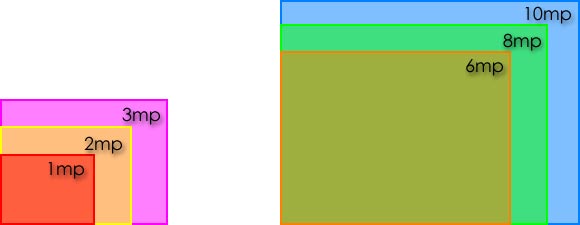|
||
|
Megapixels Explained So what is a megapixel anyway? It's merely the size of the image. Every picture on your screen is made out of a grid of dots (called pixels), with each dot (pixel) representing one color. Well, one megapixel is 1 million pixels. That number is obtained by multiplying the number of pixels in the length of the image by the number in the height, so 1 megapixel is around 1152x864 pixels. Now, back in the old days, a jump from 1 megapixel (1152x864) to 2 megapixels (1600x1200) resulted in a nearly 140% increase in diagonal image length and the difference between 1 megapixel and 3 megapixels is a whopping 178% increase! But as the megapixel count gets higher, that increase lessens as you can see by the following diagram:  So how many megapixels do you really need? Well, for a consumer point & shoot, 3 or 4 megapixels should serve you well. Most people make 4x6 inch prints anyway, and 3 or 4 megapixels is ample for cropping. I've even made a lot of stunning 8x10 prints with my 3 megapixel camera. For digital SLRs, the difference between 6 and 10 megapixels isn't really that big of a deal. Summary: 1 megapixel = 1 million pixels (area). Most people don't need more than 3-6 megapixels. The Problem with More Megapixels Sure, more megapixels gives you larger pictures with more room to crop, but it also creates much bigger files. Diagonally, an 8 megapixel image will be 117% larger than a 6 megapixel image, but the file size will be 133% bigger. The problem with more megapixels is that your files will be bigger, so they will take longer to load. There are some programs like Picasa that load pictures very quickly but even these programs are slightly affected by file size. Unless you regularly make poster sized prints, you don't need a ton of megapixels. Summary: More megapixels = larger file size. More Important Things There are a number of more important things that can contribute to picture quality that should take more priority than number of megapixels. For example, when buying a camera, you should pick it up and see if it's comfortable in your hands. You should also try taking a few test shots with it to see if it's fast in autofocusing, taking pictures, reviewing recorded pictures, etc. Most point and shoot cameras are so similar nowadays that it'd be hard for most people to see any difference in the pictures of two different cameras. Therefore, you should take your own personal preferences in mind when choosing a camera: pick something that feels fast, is good in your hands, and wouldn't mind using for a whole day. On the other hand, you might want to check out some of the nifty features that are included in some cameras now, such as optical image stabilization. Summary: Choose cameras subjectively, and pick what you personally like about its feel. So Then What Are Megapixels Good For? Well, as mentioned earlier, megapixels are good for cropping. If you only want a small area of your picture, having more megapixels gives you more latitude in cutting out what you don't want while still retaining good picture quality in a 4x6 print. Also, if you want to make poster-sized prints (20x30 inches and larger) then you'll most likely want 6 megapixels or more. Think of having more megapixels as having more flexibility, but as demonstrated above, as you get higher and higher in megapixels, the flexibility gains tend to diminish. 2 megapixels is better than 1, but 10 megapixels isn't much better than 8 megapixels. Summary: More megapixels = more flexibility in cropping or large prints. |
||
Back to Main Digital camera help, tips on digital cameras, and camera techniques. Canon Powershot camera help and Nikon digital camera tips. Canon SLR and Canon camera tutorials. Nikon SLR, Panasonic, Casio, and Pentax digital camera technique. All content on these pages are Copyright 2007-2011 Yu Jiang Tham. No content from this website may be used or duplicated without express permission from the owner. Please email support@facethelight.com for more information. FaceTheLight.com is part of The Happywalrus Network - Get Free Stuff and Make Money! |